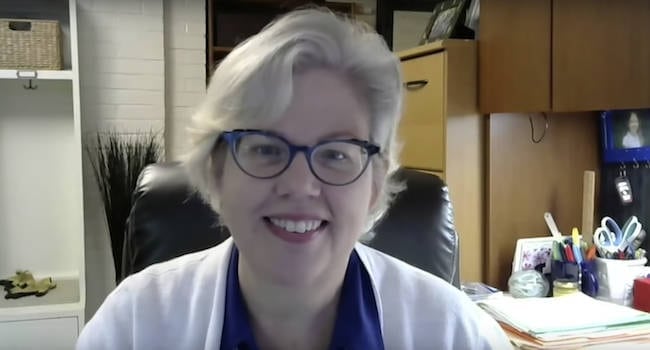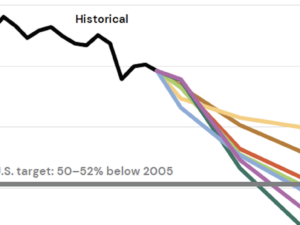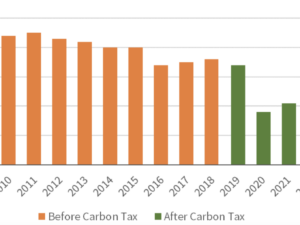Adele Morris explains economic appeal of carbon pricing
By Sara Wanous
Each month, Citizens’ Climate Lobby hosts an online meeting featuring a guest speaker to educate listeners on topics related to climate change and our Carbon Fee and Dividend proposal. Check out recaps of past speakers here.
On our national call this July, we welcomed Brookings Institution senior fellow and policy director for climate and energy economics Adele Morris. Adele lives and breathes economics, and her research has shown that carbon pricing is a smart solution. She is a leading global expert on designing carbon pricing policy and her research informs critical decisions related to climate change, energy and tax policy.
Adele is no stranger to CCL. She has been sharing her expertise with us as far back as 2014, and at our recent June 2018 International Conference, she spoke on our keynote panel about why carbon pricing is a smart policy decision. A week after our lobby day, she got a call from a Republican member of Congress requesting a meeting with her. In the face-to-face meeting, they talked about how to design a carbon tax and the member asked many smart questions, clearly informed by CCL volunteers. Adele appreciates that what we do really resonates with Congress, and she invited us to “drop [her] name any time.”
At CCL, we know that carbon pricing has been vetted by economists and policy experts and is supported by them as an effective approach, but why do they like it? Adele helped us break down why, as she says, “economists are so unanimous in supporting a price on carbon.”
Why do economists support carbon pricing?
Primarily, pricing carbon is the most cost effective way to address climate change. By its nature, carbon pricing incentivizes the lowest cost climate solutions. It gives a boost to renewables relative to their fossil fuel competitors and lets the lowest cost solutions prevail.
Carbon pricing also works instantly. The price immediately determines which power plants are going to operate more and which sources of energy will be more profitable.
Furthermore, carbon pricing is a wide-reaching solution. Putting a price on carbon is the most efficient way to create a wide range of incentives all across the economy and for a long period of time. Adele explained,“If [investors] see the relative prices and relative profits of different kinds of technologies or economic activities are going to be changing and they see that in a predictable way, that’s going to harness American capital markets and further incentivize a lower carbon future.”
Important questions for carbon pricing policy
As a global expert in designing carbon pricing policy, Adele mentioned that there are certain essential questions that one must ask to design a price on carbon.
At the top of the list is what exactly are you going to price? There are a wide range of options across types of fuels, greenhouse gases, sources, and sectors to choose from. Adele says that economists recommend assessing the price where you can find the most measurable sources with responsible parties as possible. She elaborated that this is done most efficiently if the price is assessed where the energy enters the economy. That’s exactly what CCL recommends in our Carbon Fee and Dividend policy.
Also among the essential questions is what we should do with the revenue. CCL recommends returning all revenue equally to households. Adele provided that other commonly discussed uses for this revenue could be targeted rebates, paying down the deficit, compensation for coal workers and coal reliant communities, or to prevent cuts in Social Security, Medicare, or other programs. Based on her experience advising policy, she believes that the “best” use of the revenue largely depends on what gets political traction at the time.
Recent economic modeling of carbon pricing
Adele recently co-chaired a multi-model study of a United States carbon tax under the Stanford Energy Modeling Forum. This study featured 11 economic models that would predict what would likely happen to both the U.S. and global economies if the United States instituted a price on carbon. They studied variations of carbon pricing policies that had different starting prices, different rates of growth, and different uses of the revenue (a household divided, tax cuts on labor income, and tax cuts on capital income).
“Some of the most robust results, which probably shouldn’t be a surprise to you, is that a carbon price lowers emissions, and it can lower emissions very dramatically and very quickly,” Adele said. She explained, “By changing the relative prices of all the fuels that go in the economy, you’re immediately incentivizing substitutions, and where the substitutions are most profound are in the power sector.”
Beyond the substantial reductions in carbon emissions from the power sector in the first 10 years, Adele also assured, “None of this wrecks the economy! You guys can feel very confident—there are robust, multi-model results that show that even if you don’t count all of the economic benefits of cleaner air, and a protected climate, you’re still having just the tiniest perturbation in the GDP that we would otherwise have.”
“This is an incredibly low cost, high impact policy,” Adele said based on of her and her colleagues’ research. That’s why Adele and more than 100,000 CCL supporters are confident in carbon pricing as a climate solution.
To hear more from Adele, including some Q&A with CCL volunteers, watch the entire July meeting on YouTube or listen to the podcast. Follow the Brookings Institution on Facebook and Twitter at @BrookingsInst and Adele Morris at @AdeleCMorris.
Sara Wanous has been the Membership Coordinator at Citizens’ Climate Lobby since January 2018. She has a B.A. in Economics and B.S. in Environmental Science and Policy from Chapman University and is pursuing a masters in Climate Science and Policy at the Scripps Institute of Oceanography.






